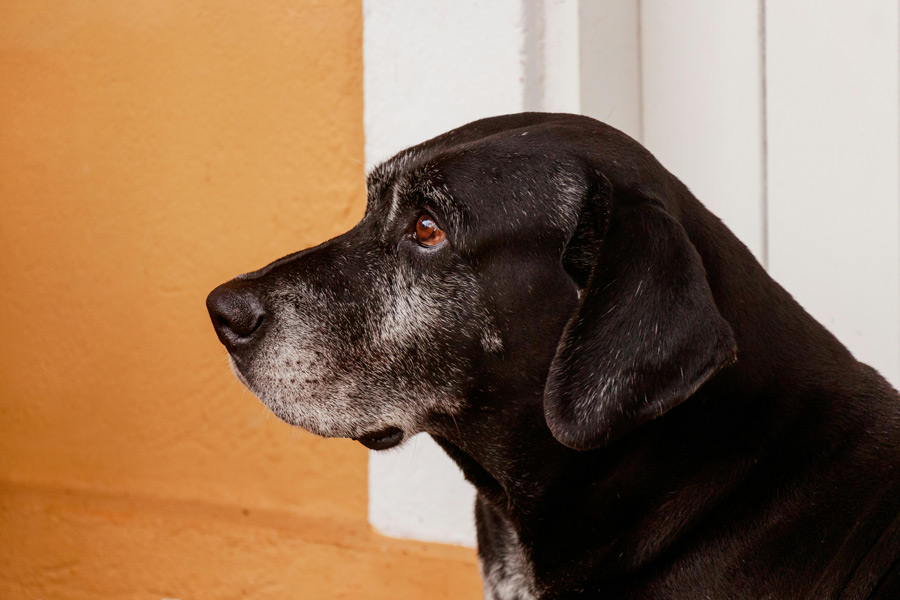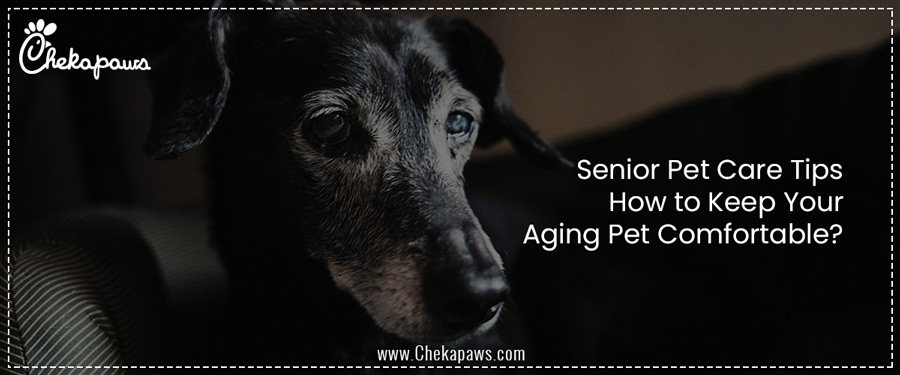Our beloved dogs need more care as they age in order to stay happy, healthy, and comfortable. With the correct care, you can improve their quality of life despite the physical and mental changes that come with ageing. This is a thorough instruction on how to take care of your elderly pet on how to keep your aging pet comfortable.
Table of Contents

1.Understanding the Aging Process in Pets
Pet ageing depends by breed and species. Although larger breeds may age more quickly, dogs and cats are typically regarded as seniors at seven years old. Common indications of ageing include:
- Reduced energy
- Problems with joint stiffness and movement
- Skin changes and greying fur
- Weight or appetite changes
- More sleep
- The impairment of thinking
Being aware of these changes helps pet owners to take precautions for the comfort of their furry companions.
2.Proper Nutrition for Senior Pets
Pets nutritional requirements change as they become older. Giving them the proper diet is essential for their general health.
The Balanced Diet
- High protein: Improves in maintaining muscular mass
- Reduced calorie intake: Prevents obesity via slowing metabolism
- Omega-3 fatty acids: Promotes joint health and lowers inflammation
- Foods high in fibre: Promotes intestinal health
- Essential minerals and vitamins: Boosts immunity
Hydration Is Important
Older pets are more prone to dehydration because they might not consume as much water. To increase moisture intake, make sure fresh water is always available and think about feeding them wet meals.
Routine Veterinary Check-Ups
Regular veterinary examinations may help in the early detection of age-related diseases. Your veterinarian may suggest:
- Biannual health examinations
- Blood tests and liver, kidney, and heart health screenings
- Cleanings of the teeth to avoid gum disease
- Even with elderly pets, vaccinations and parasite prevention should be continued.
3.Managing Mobility and Joint Problems
Senior pets can suffer from joint pain and arthritis. Here’s how to ensure their comfort:
Physical Activity and Weight Control
- Low-impact, moderate activities include swimming along with short walks.
- Keep your pet at a healthy weight to ease the pressure on their joints.
Supplements and Medications
- Glucosamine and chondroitin: Support in joint lubrication
- Supplemental omega-3: Lowers inflammation
- Painkillers: prescribed by your veterinarian
Home Modifications
- For extra convenience, provide orthopedic pet beds.
- To make furniture reachable, install stairs or ramps.
- For slippery flooring, use non-slip rugs to reduce the risk of falls.
4.Mental stimulation and cognitive well-being
Older pets may suffer from cognitive decline, just like people. Disorientation, anxiousness, and irregular sleep patterns are some of the symptoms.
Ways for Maintaining Mind Activity
- Puzzles about food and interactive toys
- Mild exercise sessions to strengthen brain
- Daily practices to reduce worry and stress
5.Comfort and Home Environment
Senior pets want a comfortable, safe space to sleep in.
- Building a Cozy Environment
- Comfy beds in a cozy, peaceful space
- Avoid high temperatures by using cooling mats in the summer and heating cushions in the winter.
- Clear the clutter so that pets with visual impairments can navigate more easily.
6.Grooming and Hygiene
For elderly pets who might have difficulty taking care of themselves, regular grooming is important.
Tips for Grooming
- To avoid matting and encourage circulation, brush the fur.
- To prevent problems with movement, trim their nails.
- To avoid infections, keep your eyes and ears clean.
- Dental care: To avoid gum disease, brush their teeth or use dental chews.
7.Managing Chronic Conditions
- Chronic diseases including diabetes, kidney disease, or heart issues affect a lot of elderly pets.
- Keeping an eye on and managing health issues.
- Observe the medications and treatments prescribed by your veterinarian.
- If required, provide a specific diet.
- Look for any indications of discomfort or worse symptoms.
8.Emotional Well-Being and Companionship
- Even elderly pets require affection and care.
- Ways to convey Love
- Soft touches and embraces
- Spending quality time together through peaceful pursuits
- Social contacts with pets and people you know
9.Preparing for End-of-Life Care
Even though it’s an emotive topic, making arrangements for your pet’s last days ensures their comfort.
- Senior Pet Considerations
- Talk to your veterinarian about pain management alternatives.
- Palliative care or hospice care
Conclusion
Taking care of an elderly pet requires tolerance, empathy, and a dedication to adapting to their changing needs. Your pet can live out their elderly years to the fullest with the right diet, medical attention, mental stimulation, and a cozy home environment. Keep in mind that your pet’s senior years are just as wonderful as their younger ones because of the growing affection and bond you have with them.







